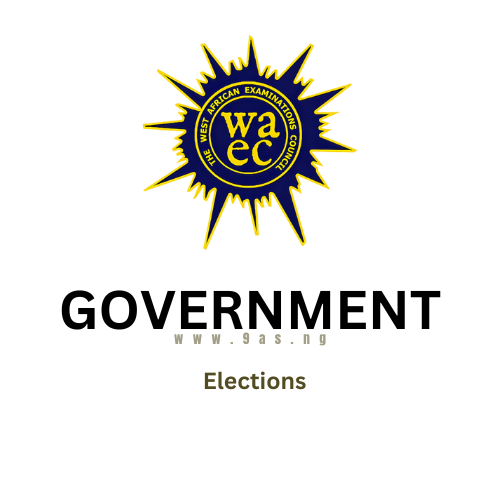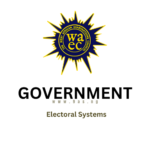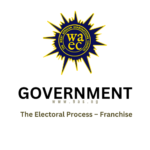THEORY
1. Highlight the conditions necessary for a free and fair election.
2. Why is election necessary in a democratic state?
3. Give three reasons for holding elections in a state.
4. In what five ways can elections be made free and fair in a country?
5. (a) Define a constituency
(b) Highlight any four merits of a single member constituency.
6. (a) State three types of election.
(b) Explain four purposes served by election in democratic state.
OBJECTIVES
1. Which of the following is a method of acquiring political power in a democracy?
A. heredity.
B. election.
C. imposition.
D. selection.
2. To make elections hitch-free electoral commission must be
A. able to punish electoral offenders.
B. given a spacious office accommodation.
C. ready to help the government.
D. independent of the executive.
3. The purpose of an election is to
A. allow people to participate in choosing their leaders.
B. provide social amenities for the electorate.
C. declare election results.
D. give people political education.
4. The geographical units into which a country is divided for the purpose of elections are called
A. constituencies.
B. polling.
C. local government areas.
D. states.
5. Free and fair election is necessary for democracy to thrive because it
A. makes an unpopular candidate emerge as a winner.
B. helps the people to exercise their popular sovereignty.
C. makes a popular party to lose in election.
D. prevents smooth change of government.
6. The geographical units into which a country is divided for the purpose of election are called
A. States.
B. constituencies.
C. polling areas.
D. country councils.
7. One way to ensure a free and fair election is to
A. operate a one-party system.
B. allow parties to campaign on election day.
C. guarantee the security of electoral officers and materials.
D. appoint a politician as the chairman of the electoral commission.
8. An election which involves the use of an electoral college is
A. run-off election.
B. a general election.
C. an open balloting.
D. an indirect election.
9. Elections are conducted to
A. provide permanent employment for the people.
B. make the people choose their leaders.
C. know the number of people in a country.
D. know the social amenities in the community.
10. Election among candidates from the same party before the final elections are called
A. Primaries.
B. Running Mates.
C. Second ballots.
D. Party conventions.
11. For an election to be fair and free, the Electoral Commission must be
A. ready to manipulate results.
B. ready to reject criticisms.
C. headed by a minister in the executive.
D. independent of other institutions of government.
12. Which of the following categories of people can vote in periodic elections?
A. Minors.
B. Aliens.
C. Lunatics.
D. Citizens.
13. The act of influencing voters through material gifts is known as
A. favouritism.
B. rigging.
C. propaganda.
D. electoral malpractice.
14. The process whereby the electorate votes for 67 representatives who in turn vote on their behalf is
called
A. an indirect election.
B. an unfair election.
C. a rigged election.
D. a disputed election.
15. An election which is conducted to fill a vacant seat in a legislature is called a
A. bye-election.
B. general election.
C. referendum.
D. plebiscite.
16. Which of the following is an example of a general election?
A. Bye-election.
B. Presidential election.
C. Local election.
D. Student union election.
17. For an Electoral Commission to conduct a free and fair election, it must be
A. controlled by the government.
B. funded by only one of the political parties.
C. an impartial and independent body.
D. supervised by a government agency.
18. An electoral college refers to A. training school for electoral officers.
B. medium of indirect election.
C. means of educating the electorate.
D. place where public opinion is formed.
19. The purpose of an election is to
A. allow people to participate in choosing their leaders.
B. provide social amenities for the electorate.
C. give political education to the rich.
D. allow the counting of votes in public.
20. An indirect election takes place when
A. election is conducted for seats in the legislature.
B. voting is by proxy.
C. election result is decided by the Judiciary.
D. elected representatives vote on behalf of the electorate.
21. Which of the following is not a factor that promotes democratic electoral system?
A. Political consciousness.
B. Periodic election.
C. Up-to-date electoral register.
D. Popularity of the governor.
22. A bye election is conducted when
A. the Parliament is dissolved.
B. the Chief Justice resigns or dies.
C. a Minister resigns.
D. some vacant seats exist in Parliament.
23. A factor that could make elections to be free and fair is the
A. existence of dependent electoral commission.
B. adoption of a flexible constitution.
C. opportunity for people to vote twice.
D. registration of eligible voters.
24. A ‘Yes’ or ‘No’ vote on a specific political issue in a country is called
A. referendum.
B. public opinion.
C. gerrymandering.
D. suffrage.
25. Which of the following does not affect delimitation of constituencies?
A. Population density.
B. Geographical expanse.
C. Accessibility.
D. Availability of officials.
26. Which of the following is not a purpose of election?
A. Political recruitment.
B. Rigging.
C. Exercise of franchise.
D. Legitimacy.
27. The referring of political question to electorate for a decision is known as
A. referendum.
B. election.
C. mass media.
D. public opinion.
28. The deliberate tampering with the boundary of constituencies in order to win more seats is called
A. devolution.
B. gerontocracy.
C. delimitation.
D. gerrymandering.
29. The electoral officer charged with the responsibility of announcing election results is the
A. Resident Electoral Commissioner.
B. Returning Officer.
C. Supervisory Presiding Officer
D. Presiding Officer.
30. The following are the aims of an election except that
A. a group sticks onto power.
B. there is accountability of the leaders there is a smooth change of government.
D. the people determine who rules,
31. An election held to fill a vacant post in the legislature due to the death or resignation of a
member is called
A. run off election.
B. electoral college.
C. bye-election. D. primary elections.
32. An election held to determine an important constitutional issue is called a
A, direct election.
B. counter election.
C. general election
D. referendum.
33. An election held to determine an important constitutional issue is called a
A. Political party
B. Pressure group
C. Humanitarian society
D. Relief organization
34. A free and fair election requires all the following except
A. political parties.
B. a long campaign period.
C. gerrymandered constituencies
D. registration of all qualified voters.
35. An electoral college is a
A. format indirect election.
B. school for electoral officers.
C-college which trains party leaders.
D. policy to dissolve constituencies
36. Which of the following does not relate to elections?
A. Dividing the country into constituencies.
B. Registering voters.
C. Printing voters’ cards.
D. Impeachment of the president.
37. A singled member constituency is one in which
A. two or mare representatives are elected from one constituency.
B. only one candidate can contest election.
C. only one representative is elected from each constituency.
D. opposition candidates are not allowed to contest elections.
38. Indirect election refers to an election that is
A. conducted through an electoral college.
B. allows as voters to vote for themselves.
C. is solely organized by the citizens.
D. allows voters to cast their votes openly
39. A multi-member constituency is one in which
A. two or more parties are allowed to contest elections.
B. franchise is restricted.
C. the electorate is entitled to vote only once.
D. two or more representatives are elected from one constituency.
40. An election in which people vote for issues of public policy rather than candidates is known as a
A. mini election.
B. general election.
C. bye-election.
D. referendum.
41. Elections are held for the purpose of
A. strengthening the powers of the political leaders.
B. ensuring a peaceful change of government.
C. creating more political parties.
D. uniting the people of a country.
42. Free and fair election can exist where there is
A. double voting.
B. secret balloting.
C. referendum.
D. plebiscite.
43. An election, held to resolve important political question facing a country is called
A. referendum.
B. bye-election.
C. general election.
D. primary election.
44. Which of the following is an indirect form of election?
A. Electoral college.
B. General election.
C. Referendum.
D. Bye-election.
45. One of the main functions of an election is
A. co-ordination of electoral activities.
B. making of rules for governance.
C. legitimization of the government.
D. creating an avenue for politicians to make money.”
46. The arrangement by which a country is divided into parts for election purposes is called
A. enfranchisement.
B. gerrymandering.
C. delimitation.
D. democratization.
47. The process by which voters may remove a public officer before the end of his term of office is called.
A. gerrymandering.
B. recall.
C. bye-election.
D. referendum.
48. A yes or no vote cast by electorate to decide an important issue in an area is known as
A. franchise.
B. plebiscite.
C. electoral college.
D. public opinion.
49. An electoral system which allows party members to elect candidates for elective office is called
A. general election.
B. by election.
C. direct election.
D. primary election.
50. Indirect election is best described as
A. only women electing legislators.
B. the citizenry electing legislators.
C. electoral college electing legislators.
D. only adults electing legislators.
51. The type of election which allows party members to elect candidates for elective offices is
A. general election.
B. bye election.
C. direct election.
D. primary election.
52. Which of the following is not an electoral malpractice?
A. Impersonation
B. Threatening
C. Campaigning for a candidate
D. Gerrymandering.
53. An electoral system in which the electorate elects a small group of people who in turn elects political
office holders is known as
A. general election
B. second ballot system
C. electoral college
D. local election
54. Elections plays a major role in the democratic process because, it
A. projects the class system
B. confers legitimacy
C. ensures only good people rule
D. manipulate the electoral process



